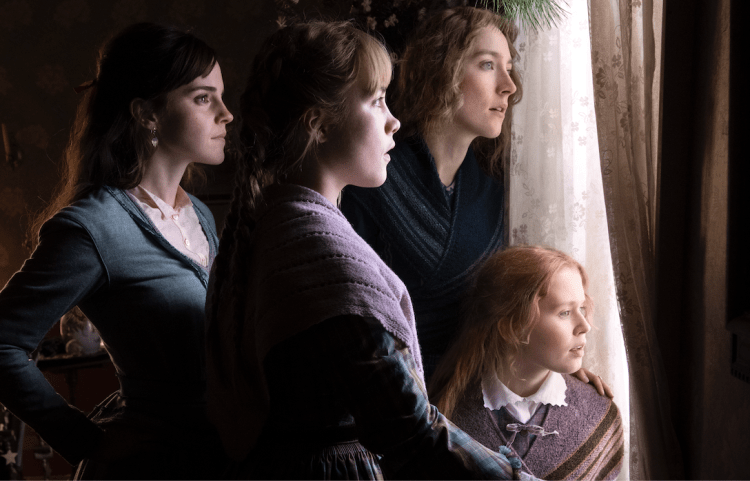Does the world need one more adaptation of Louisa May Alcott’s Little Women? After viewing Greta Gerwig’s cover version, the answer is a loud Hell Yes. Gerwig (writer/director Ladybird, 2017) delivers a film that hits the emotional highs and lows of this beloved novel while showing us the narrow culture that stifled the March women economically and personally. Other adaptations glorify waking up to no Christmas presents. This version lets the cold in.

This film version doesn’t shirk from showing the genteel poverty and its frustrations – their once beautiful house is now shabby and worn, the house is too cold in winter, and they only have one servant. Nevertheless, the March sisters are well-educated and accomplished in their arts. Marmee (Laura Dern), like Alcott’s parents, volunteers for the underground railroad, aids the needy in her community and acts as a liaison for Civil War veterans in need. These, and other, brief but key scenes, tell us the Marches find their culture and social mores (1860s America) stifling and frustrating.
We see this frustration through Jo (Saoirse Ronan) and Amy (Florence Pugh). Their arts, writing, and painting, respectively, drive them beyond narrow cultural expectations. “I will be great or nothing,” Amy famously says. When she realizes, objectively, that her paintings are not “genius,” she vows to stop, and polish other aspects of herself and be an ornament to a wealthy husband. This critic wondered whether she chose the devil she knows over one she did not.
Jo curtails her writing in favor of adapting the her current market. Writing penny dreadfuls is what sells and Jo, who shares Amy’s clarity about the world, frankly states that it’s her job to support her family until Amy marries someone wealthy. Her growth as an artist from resignation to a gleeful tenaciousness that carries the day is a delight.

Gerwig’s Beth (Eliza Scanlen) and Meg (Emma Watson), tepid and uninteresting in the source material, suffer that same fate in the film. Perhaps there’s an argument for Beth showing us the virtue of goodness and sacrifice over the pursuit of worldly success. There’s so little of Beth in the film, though, that this critic cannot give an informed opinion.
Watson plays Meg with an emotional depth and fluency that, at times, lifts her out of the obedient and domestic sphere and into the fully realized. She enters into her future aware that it won’t be easy. She expresses discontent at her lot but then retreats when the conversation gets hard. But given her circumstances and the times does she have any other choice?
If Gerwig is a bit heavy handed with the “marriage is an economic proposition” theme it’s because, for the March sisters, marriage is an economic proposition, the only one open to them. The few respectable career paths for women of their class don’t pay a living wage and the viable careers are so far outside their social class, they will lose their family and friends. Jo shares with her grumpy and savvy Aunt March (Meryl Streep) that she wants to make her own way like her aunt. Her aunt replies that she was able to do that because she was rich. Meg reconciles herself to her choice of a poor yet genteel man. Amy is too aware of what a marriage will do for her and chooses accordingly. Jo doesn’t pursue the man she loves until she undergoes a surprise change in circumstances.

The men in the film are peripheral characters but manage to wield a lot of power. Laurie (Timothée Chalamet), a childhood friend and default chaperone, is the outside force that keeps those March girls in line. He escorts them to the theater and concerts. He chastises Meg for dancing at a debutante ball and drinking a glass of champagne. He publicly derides Amy for “wanting” to marry a wealthy man. He steps up for Jo at a family dinner, instead of Mr. March (Bob Odenkirk). Mr. March, once a wealthy man but now a chaplain, appears to make no decisions in his house but that’s because once he returns, it revolves around him. Meg engages her husband in a crucial conversation about their financial future and suggests that they work together towards a solution. Her husband refers to their financial resources as his and the conversation is over.
What lifts this film up and shows us the innate courage of the March sisters, because to be oneself in spite of the time and place that’s forbids it, is quite courageous. Through the Marches frustrations and struggles, we see a happy family. The sisters’ strengths and weaknesses compliment each other. They genuinely like each other and inspire each other in their respective arts as well as their lives. They face their challenges and triumphs without compromising their moral centers, knowing they have the strength of their sisters to fall back on.
Current readers grew up in a culture and time where women can hold any job they want, have their own bank account, own their own homes and vote. Watching the March sisters triumph within their narrow circumstances is a balm because it’s also a story of sisterhood and family. Yet I will always wonder what the March sisters would have accomplished if they had had the same opportunities we all take for granted now.
4 thoughts on “Little Women: Women, Worth and Owning Your Story”